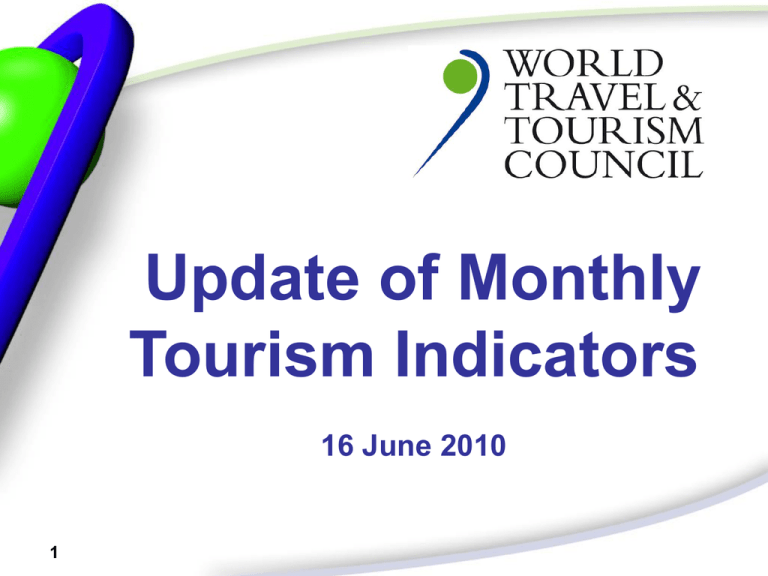1 Update of Monthly Tourism Indicators 16 June 2010 2
advertisement

Update of Monthly Tourism Indicators 16 June 2010 1 Overview • Air passenger traffic volumes plummeted in April, as the Icelandic volcanic eruption led to widespread disruption for would-be travellers. The regional breakdown indicated that the slowdown was truly global although the impact was most apparent in Europe where volumes were down 11.7% on the year in April compared to a 6% rise in March. • In countries where data is available the impact of events in April was clear, if not as marked as suggested by the IATA figures. For that group of 20 countries growth slowed to 6.9% on the year compared to 11.8% in March. The cause of this discrepancy is probably that countries where arrivals data was available through to April were principally located in Asia-Pacific, where the fallout from the eruption was less severe. • The incorporation of new data on visitor arrivals from Haver, Eurostat and PATA reaffirms our view that 2010Q1 was marked by a relatively robust rebound in activity. Based on available data we estimate that arrivals were up by 5.7% on the year, although mature markets, particularly in Europe continued to struggle. 2 Air passenger volumes growth plummets in April… International air passenger traffic growth % year, RPK 15 12 9 3mth mav 6 3 0 -3 -6 -9 RPK = revenue passenger kms -12 Jan-05 Jan-06 Source: IATA 3 Jan-07 Jan-08 Jan-09 Jan-10 …as volcanic eruption inflicts widespread damage… International air passenger growth by region % yr 28 24 February March 20 16 12 8 4 0 -4 April -8 -12 -16 Africa Asia/Pacific Europe Source: IATA 4 Latin America Mid.East N.America World …following relatively strong Q1 World: Short-term tourism indicators % year, 3mth mav 10 IATA international traffic growth (RPK) 8 6 4 2 0 -2 -4 -6 -8 -10 -12 ` Annual data/forecast for visitor arrivals Overnight visitor arrivals† RPK = revenue passenger kms †based upon monthly data covering 80% of world arrivals -14 Jan-05 Jan-06 Jan-07 Jan-08 Jan-09 Jan-10 Source: IATA, PATA, Haver, Eurostat, Oxford Economics, WTTC, CTO 5 18 countries yet to provide 2010 data Overnight visitor arrival growth in 2010 (% year-on-year, January 2010 to the indicated month) Austria Belgium Denmark Finland France Germany Greece Italy Luxembourg Netherlands Portugal Spain Sweden UK Bulgaria Cyprus Year to: % Mar #N/A Mar Jan Mar Feb #N/A Jan #N/A Jan Feb Mar #N/A Apr Feb Apr 4.8 -5.1 -6.8 -2.4 -1.6 7.0 -7.7 3.8 1.1 0.9 11.0 0.1 0.1 -4.0 7.9 -8.2 Year to: % Canada US Mexico Chile Anguilla Antigua & Barbuda Aruba Bahamas Barbados Bermuda Cayman Islands Cuba Dom Republic Dominica Grenada Jamaica Mar Jan Mar Apr #N/A #N/A Feb #N/A Apr Jan Mar Feb Apr Feb Mar Feb -0.2 8.3 -2.8 -8.1 -16.0 -11.8 2.0 -13.8 -0.5 -17.9 8.3 -3.4 2.3 -4.4 0.0 6.3 #N/A -8.9 Jan 8.3 % Apr Apr Apr Apr May Apr Apr 16.0 0.8 16.3 23.3 11.3 17.1 21.0 #N/A May Apr Mar #N/A Jan Apr Mar #N/A -3.5 48.5 11.1 14.5 15.6 1.4 37.4 21.8 4.3 Singapore Apr 19.8 Thailand Apr 21.9 Pakistan Sri Lanka Cambodia Indonesia Laos Malaysia Myanmar Papua New Guinea Philippines Czech Rep Mar 1.0 Martinique Estonia Feb 13.7 Puerto Rica Hungary #N/A -9.7 St Kitts #N/A -12.5 Vietnam Apr 37.5 Latvia Jan 2.5 St Lucia Mar 12.5 Australia Apr 3.5 Lithuania Jan -10.7 St Vincent #N/A -10.3 New Zealand Mar 4.1 Malta Feb 6.5 British Virgin Islands #N/A -25.0 Fiji Mar 26.4 Poland Feb 4.4 US Virgin Islands Mar 15.0 Kiribati #N/A 30.8 Romania Feb -3.2 Bahrain Mar 7.3 Tonga Feb -8.9 Slovakia #N/A -26.9 Israel May 30.0 Vanuatu Mar -18.0 Slovenia Montenegro Mar Mar 4.0 -14.0 Jordan Lebanon Apr Mar 32.9 23.1 REGIONAL ESTIMATES (1) Europe Mar 0.8 Croatia Iceland Norway Switzerland Turkey Feb Feb #N/A Feb Apr -15.5 5.0 -8.8 1.8 6.8 Mar Mar Feb Apr Apr Apr 29.0 7.3 7.8 -3.6 28.4 3.6 Americas Middle East Africa Asia-Pacific Mar Mar Mar Mar 4.1 17.6 16.2 11.2 WORLD Mar 5.7 Egypt Mauritius South Africa Tunisia Japan China NB. Where there is no 2010 data yet available 2009 growth is listed instead 6 Year to: Hong Kong South Korea Macau Taiwan India Maldives Nepal (1) based on these 90 countries only; coverage good for Europe, North America, the Caribbean and Asia-Pacific but very limited elsewhere Source: Oxford Economics






